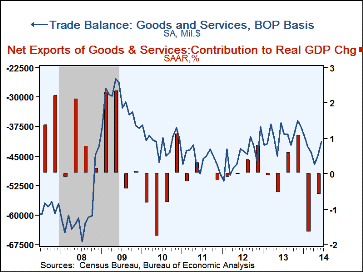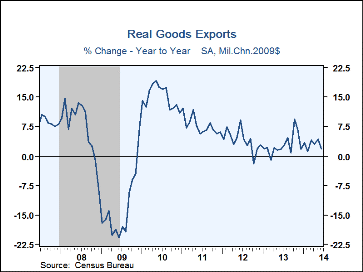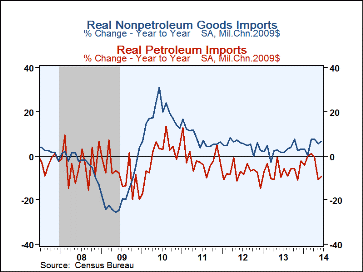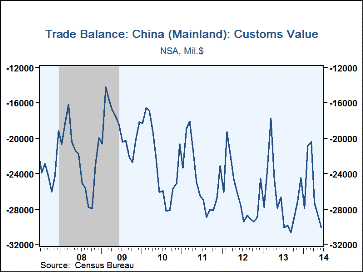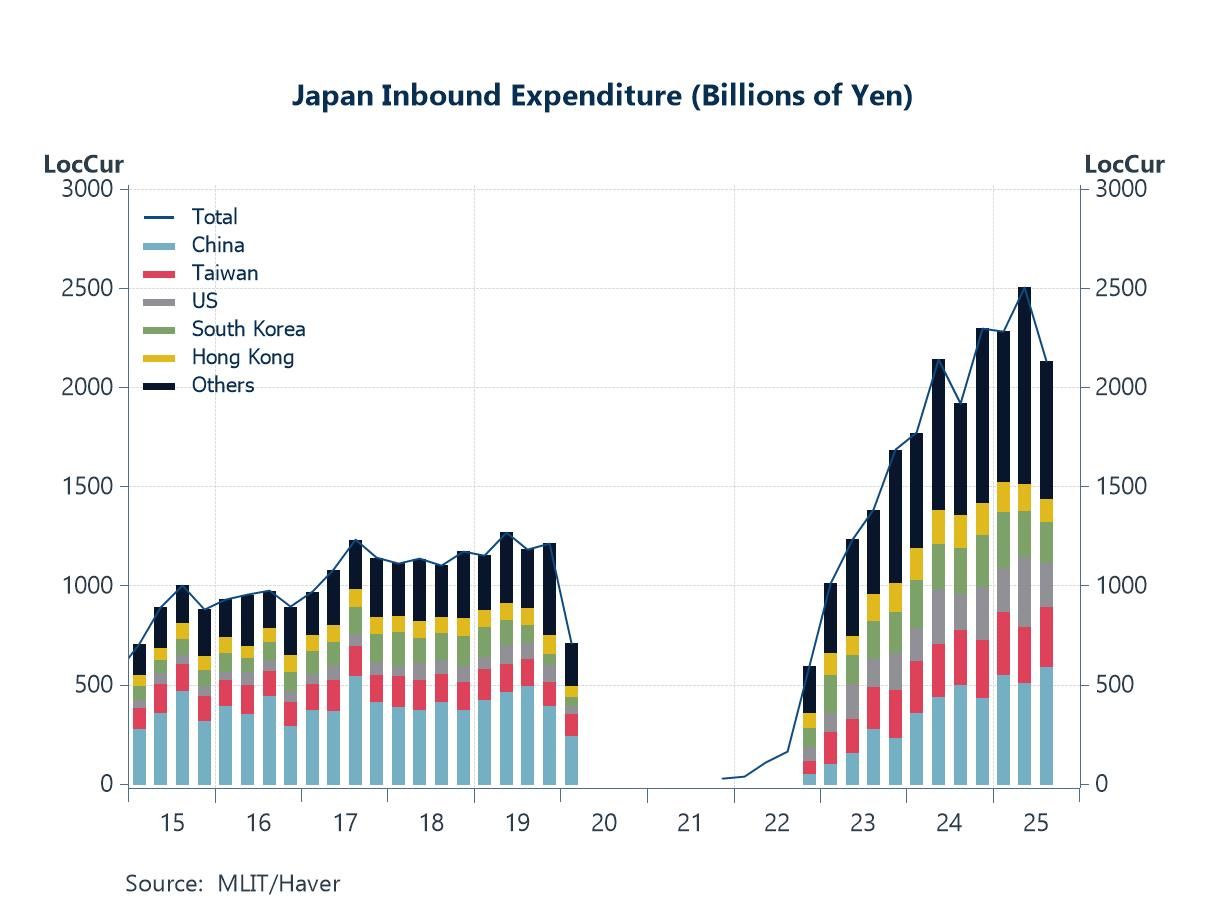 Global| Aug 06 2014
Global| Aug 06 2014U.S. Trade Deficit Declines as Imports Fall
by:Tom Moeller
|in:Economy in Brief
Summary
The U.S. foreign trade deficit during June eased to $41.5 billion from $44.7 billion in May. The deficit was the smallest since January and shallower than consensus estimates for $44.3 billion in the Action Economics Forecast Survey. [...]
The U.S. foreign trade deficit during June eased to $41.5 billion from $44.7 billion in May. The deficit was the smallest since January and shallower than consensus estimates for $44.3 billion in the Action Economics Forecast Survey. The narrower deficit was the result of a 1.2% decline (+4.6% y/y) in imports countered by a 0.1% uptick (2.9% y/y) in exports.
The overall trade deficit in goods narrowed to $59.4 billion, its smallest since February, despite a wider deficit with mainland China. It deepened m/m to $30.1 billion, the largest shortfall in nine months. Exports to China rose 1.5% y/y but imports surged 9.8% y/y. The trade deficit with the European Union eased m/m to $11.2 billion. U.S. exports gained 7.8% y/y while imports rose 18.2% y/y. With Japan, the trade deficit fell m/m to $5.4 billion. U.S. exports slipped 0.5% y/y but imports declined 1.7% y/y.
In constant dollars, the trade deficit in goods fell to $48.8 billion, its least since February. Inflation adjusted exports gained 0.3% (1.9% y/y). The constant dollar value of nonauto consumer goods exports rose a steady 2.4% (5.8% y/y) while real auto exports improved 1.1% (7.2% y/y). They've risen significantly in three of the last four months. Real exports of industrial supplies & materials gained 0.8% but were unchanged y/y. Real foods, feeds & beverages exports notched 0.2% higher (9.8% y/y) while real capital goods exports were roughly unchanged (-0.6% y/y), off slightly during the last three months. Services exports edged 0.2% higher (3.5% y/y). Travel exports increased 1.1% (7.7% y/y) as more tourists visited the United States.
In constant dollars, nonpetroleum imports fell 1.1% (+6.5% y/y). Inflation adjusted foods, feeds and beverages imports increased 4.0% (9.7% y/y) but other imports declined. Real capital goods imports slipped 0.7% (+7.0% y/y). Real nonauto consumer goods imports fell 2.6% (+4.2% y/y) and real auto imports fell 3.7% (+7.3% y/y). Services imports ticked 0.1% higher (4.3% y/y) as travel imports gained 0.1% (8.3% y/y). The value of U.S. petroleum imports declined 4.9% (-7.5% y/y), about as it did in May. The quantity of petroleum product imports fell 4.4% (-8.4% y/y). The price of crude oil was roughly stable m/m at $96.41 per barrel, down from the $109.69 high reached in April 2012.
The international trade data can be found in Haver's USECON database. Detailed figures are available in the USINT database. The expectations figures are from the Action Economics Forecast Survey, which is carried in the AS1REPNA.
The Low Frequency Effects of Macroeconomic News on Government Bond Yields from the Federal Reserve Board can be found here.
| Foreign Trade (Current Dollars) | Jun | May | Apr | Y/Y | 2013 | 2012 | 2011 |
|---|---|---|---|---|---|---|---|
| U.S. Trade Deficit | $41.5 bil. | $44.7 bil. | $47.0 bil. | $36.6 bil. (6/13) |
$476.4 bil. | $537.6 bil. | $548.6 bil. |
| Exports (%) | 0.1 | 1.1 | -0.1 | 2.9 | 2.9 | 4.2 | 14.8 |
| Imports | -1.2 | -0.1 | 1.1 | 4.6 | 0.1 | 2.9 | 13.9 |
| Petroleum | -3.3 | -5.1 | -2.2 | -6.9 | -11.0 | -5.5 | 30.7 |
| Nonpetroleum goods | -1.1 | 0.5 | 2.1 | 6.9 | 2.0 | 5.2 | 12.1 |
Tom Moeller
AuthorMore in Author Profile »Prior to joining Haver Analytics in 2000, Mr. Moeller worked as the Economist at Chancellor Capital Management from 1985 to 1999. There, he developed comprehensive economic forecasts and interpreted economic data for equity and fixed income portfolio managers. Also at Chancellor, Mr. Moeller worked as an equity analyst and was responsible for researching and rating companies in the economically sensitive automobile and housing industries for investment in Chancellor’s equity portfolio. Prior to joining Chancellor, Mr. Moeller was an Economist at Citibank from 1979 to 1984. He also analyzed pricing behavior in the metals industry for the Council on Wage and Price Stability in Washington, D.C. In 1999, Mr. Moeller received the award for most accurate forecast from the Forecasters' Club of New York. From 1990 to 1992 he was President of the New York Association for Business Economists. Mr. Moeller earned an M.B.A. in Finance from Fordham University, where he graduated in 1987. He holds a Bachelor of Arts in Economics from George Washington University.


